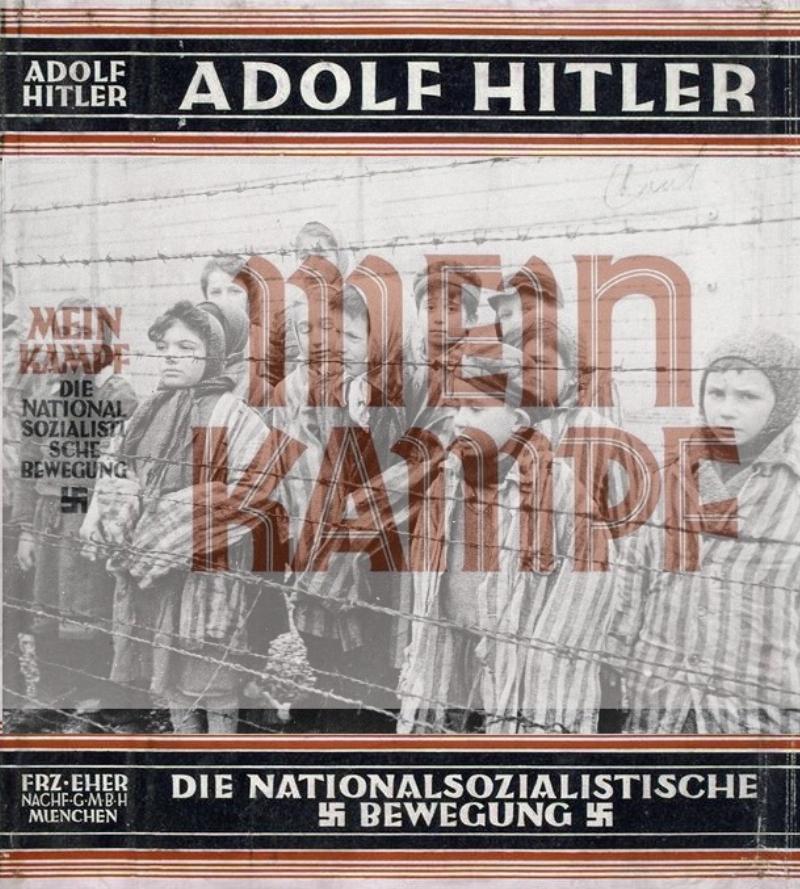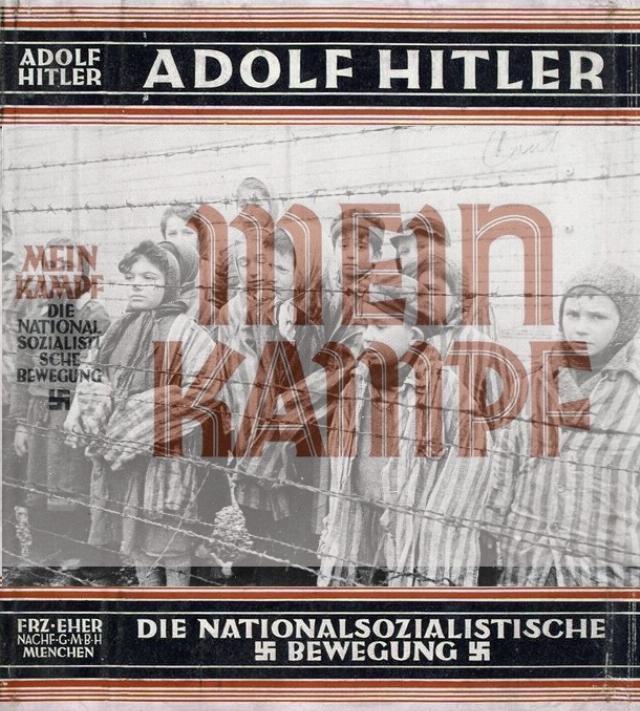


On July 18, 1925, Adolph Hitler’s book Mein Kampf (My Struggle) was published. Written while he was in Landsberg prison, where he was serving a relatively relaxing sentence for the failed 1923 Beer Hall Putsch coup, Hitler made very clear what he would do if the German people put him and the leftist National Socialist Party in power.
Mein Kampf is in two volumes. Part 1 has stories about Hitler’s life, including serving as a soldier in World War I. The book sold a paltry 9,473 copies in its first year. At the time, few people cared what a short man with a funny moustache thought.
Part 2 was published in 1927. Unlike many politicians who hide their true goals, Hitler put it all in his book for the entire world to read. He was very clear about his antisemitic views and what he would do to make Germany Judenfrei if he gained power and could implement his Third Reich agenda.

Image created using public domain images.
Sales of the two volumes continued to be slow as many Germans viewed Hitler as more of a comic (funny moustache, short, feminine speaking mannerisms, etc.). At first, they didn’t take him or his left-wing National Socialist German Workers’ Party (NSDAP) seriously. In “Hitler Was Incompetent and Lazy—and His Nazi Government Was an Absolute Clown Show,” Tom Phillips writes about how many viewed Hitler as a fool:
In fact, this may even have helped his rise to power, as he was consistently underestimated by the German elite. Before he became Chancellor, many of his opponents had dismissed him as a joke for his crude speeches and tacky rallies. Even after elections had made the Nazis the largest party in the Reichstag, people still kept thinking that Hitler was an easy mark, a blustering idiot who could easily be controlled by smart people.
In Hitlerland, Andrew Nagorski discusses the American media’s early impressions of Hitler and the Third Reich:
Yet you had Americans meeting Hitler and saying, ‘This guy is a clown. He’s like a caricature of himself.’ And a lot of them went through this whole litany about how even if Hitler got into a position of power, other German politicians would somehow be able to control him. A lot of German politicians believed this themselves.
Surprisingly, German Jews also did not take Hitler seriously during his early years. In 1925, only a few German Jewish newspapers even bothered to review Mein Kampf. As Raphael Ahren wrote in The Times of Israel article “Why Jews Didn’t Blink an Eye When Mein Kampf First Came Out”:
When Mein Kampf came out for the first time, German Jews hardly noticed it. They certainly did not view it as a threat to their existence, or even as a harbinger of a changing political climate in the Fatherland.
Rahel Straus, a physician who grew up in Karlsruhe, Germany, and emigrated to Palestine in 1933, wrote in her memoirs:
We passed by the boxes of the Volkisher Beobachter (the official organ of the Nazi Party), read the incendiary articles and indignantly continued working. We didn’t realize that this Volkisher Beobachter was one of the most read newspapers in Germany at the time. We saw Hitler’s Mein Kampf on display in every bookstore; none of us bought it, none of us read it.
Slowly, that short man with the funny moustache and his leftist Nazi Party chiseled away at the Weimar Republic. The worldwide depression that started in October 1929 gave them a growing audience of supporters. By 1932, the Nazi Party had become the largest political party in the Reichstag (the German parliament).
One year later, on January 30, 1933, Adolf Hitler was appointed Chancellor of Germany by the aging President Paul von Hindenburg. When the 86-year-old Hindenburg died on August 2, 1934, Hitler announced that the office of president and chancellor would merge under the title of Führer und Reichskanzler (leader and chancellor). Those who disagreed were free to discuss the matter at the end of a gun barrel or while laboring in Dachau.
Suddenly, sales of Mein Kampf rose to more than 1 million copies. In 1935, the Franz, Eher, Nacht publishing house suggested to Hitler that a special Mein Kampf version should be given to every newlywed couple on the day of their wedding.
The western world, still reeling from the horrors of World War I, watched what was happening in Germany and worried that another massive worldwide conflict was on the horizon. Meanwhile, Germany was ignoring the Treaty of Versailles while the Allies embraced appeasement.
After signing the Munich Agreement on September 30, 1938, between Great Britain and Germany, Prime Minister Neville Chamberlain flew back to London believing he had prevented a second European war. When Chamberlain, whose name would become synonymous with appeasement, reached the prime minister’s residence at 10 Downing Street, he read a prepared statement:
My good friends, for the second time in our history, a British Prime Minister has returned from Germany bringing peace with honor. I believe it is peace for our time….
British Prime Minister Chamberlain and, to a lesser degree, President Franklin Roosevelt bent like pretzels to avoid a second colossal world war. In the meantime, Winston Churchill, who in 1935 had read the unedited English version of Mein Kampf, was repeatedly telling anyone who would listen that it would be better to stop Hitler now before he rebuilt Germany’s army and arsenal.
Few were listening to Churchill.
By May 10, 1940, when Churchill succeeded Chamberlain as prime minister, Mein Kampf had been in the public square for nearly 15 years and was a best seller in Germany and the occupied Nazi nations. Chamberlain’s years of appeasement had resulted in:
Keep all this in mind when laughing at memes mocking intelligence-challenged politicians such as New York Representative Alexandria Ocasio-Cortez, Texas Representative Jasmine Crockett, or New York’s Communist-Democrat mayoral candidate Zohan Mamdani.
One of them might soon be writing a book called “My Struggle.”
Robin M. Itzler is a regular contributor to American Thinker. She is the founder and editor of Patriot Neighbors, a free weekly national newsletter. Robin can be reached at PatriotNeighbors@yahoo.com.
